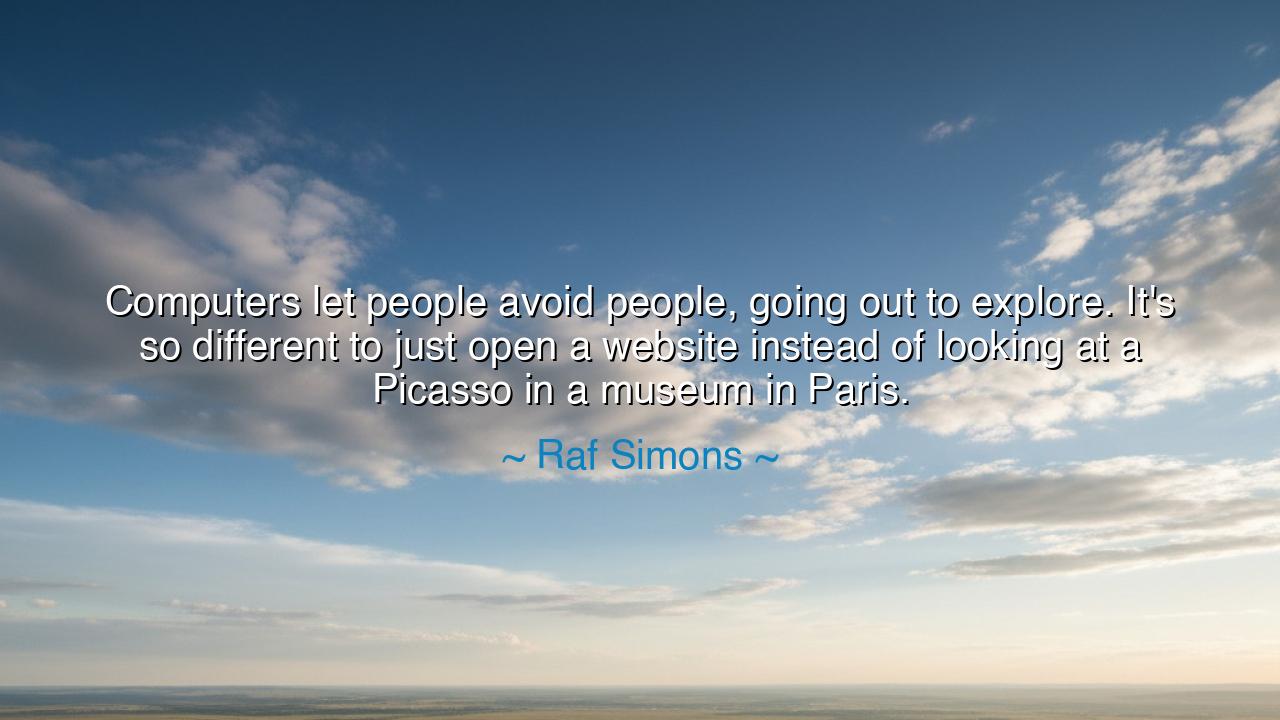
Computers let people avoid people, going out to explore. It's so
Computers let people avoid people, going out to explore. It's so different to just open a website instead of looking at a Picasso in a museum in Paris.






In the quiet hum of the digital age, where the glow of screens replaces the warmth of faces, the designer and philosopher of modern form, Raf Simons, spoke words of lament and wisdom: “Computers let people avoid people, going out to explore. It's so different to just open a website instead of looking at a Picasso in a museum in Paris.” His words are not an attack upon technology, but a mourning for what it displaces — the touch of presence, the awe of the real, the living experience of beauty. In this brief yet profound reflection, Simons speaks as a modern prophet, warning that in our pursuit of convenience, we risk losing our connection to the sacred immediacy of life.
The origin of this quote arises from Simons’ own world — that of art, fashion, and human creation. A man who lives by the rhythm of imagination, he has seen how the computer, though miraculous in its ability to connect and create, can also become a wall — a glowing barrier between the soul and the world it longs to feel. He watched as the young, once drawn to the streets, the galleries, the human hum of discovery, began to retreat into the sterile comfort of screens. In his heart, he understood that while the Internet can show us a thousand Picassos, it can never let us stand before one — never let us breathe the same air as the brushstroke, never let us feel the trembling silence of the gallery where genius lives.
When Simons says, “Computers let people avoid people,” he unveils the great paradox of the modern age. Technology has bound the world in invisible threads, yet these same threads often bind the human heart in solitude. Once, the traveler sought meaning by walking through cities, hearing voices, tasting the foreign air. Now, one can “explore” without ever leaving the chair — an exploration without risk, without wonder, without encounter. It is the illusion of experience, not its reality. For to truly explore is to be vulnerable — to meet the unknown not as data, but as life. The computer shields us from that rawness, allowing us to consume knowledge without tasting its depth.
There is a tale from the ancient world that mirrors this truth. In the age of the Greeks, the philosopher Diogenes lived not in luxury, but in a humble barrel. One day, when the great Alexander stood before him, offering him riches, Diogenes simply replied, “Stand out of my sunlight.” For Diogenes knew that wealth could obscure the essential — the direct light of reality. So too, in our own time, screens have become the gold of Alexander: powerful, dazzling, but capable of blocking the simple sunlight of living experience. When Simons warns of avoiding people, he is, in truth, echoing the wisdom of Diogenes — calling us to step back into the light of what is real.
And when he speaks of “looking at a Picasso in a museum in Paris,” he reminds us of what cannot be digitized: presence. To stand before a masterpiece is to feel the breath of the artist across time, to witness color and form as living energy. The pixels on a screen may show us the image, but they cannot transmit the soul of the work. The museum is more than a building — it is a temple of encounter, where one meets the spirit of creation and the shared humanity of all who stand in wonder beside it. To view art through a screen is to look through a window; to stand before it is to walk through a door.
Simons’ words are also a plea for human connection — for the simple act of being with others, of speaking, listening, laughing, learning. Computers, for all their brilliance, cannot replicate the texture of conversation, the unpredictable rhythm of the human face, the shared silence between two souls. To “avoid people” is to lose the very mirror through which we understand ourselves. Civilization itself was born not of isolation, but of encounter — of strangers meeting in the marketplace, of artists and thinkers gathering in the squares of Athens, of students walking beside their teachers beneath the olive trees. When we forsake that for screens, we grow clever — but not wise.
So, O seeker of wisdom in the digital age, hear the call in Raf Simons’ words. Do not let the glowing mirror of the computer replace the living world it reflects. Use technology as a bridge, not a fortress. Seek art not only in pixels, but in presence. Walk through museums. Speak to strangers. Touch the stones of ancient streets. Let your eyes meet the eyes of others, for in that meeting is the true electricity of existence. Remember that knowledge is found online, but wisdom is found in life.
The lesson of Raf Simons’ wisdom is both tender and timeless: that while the machine may multiply our reach, it must never diminish our humanity. The world is vast not because it exists in data, but because it lives in experience. The screen may show us a thousand worlds, but the soul needs only one — the one it can touch, taste, and breathe. So go forth not as a spectator behind glass, but as a pilgrim of the real. For to truly live is to step beyond the screen and rediscover the sacred art of being present.






AAdministratorAdministrator
Welcome, honored guests. Please leave a comment, we will respond soon